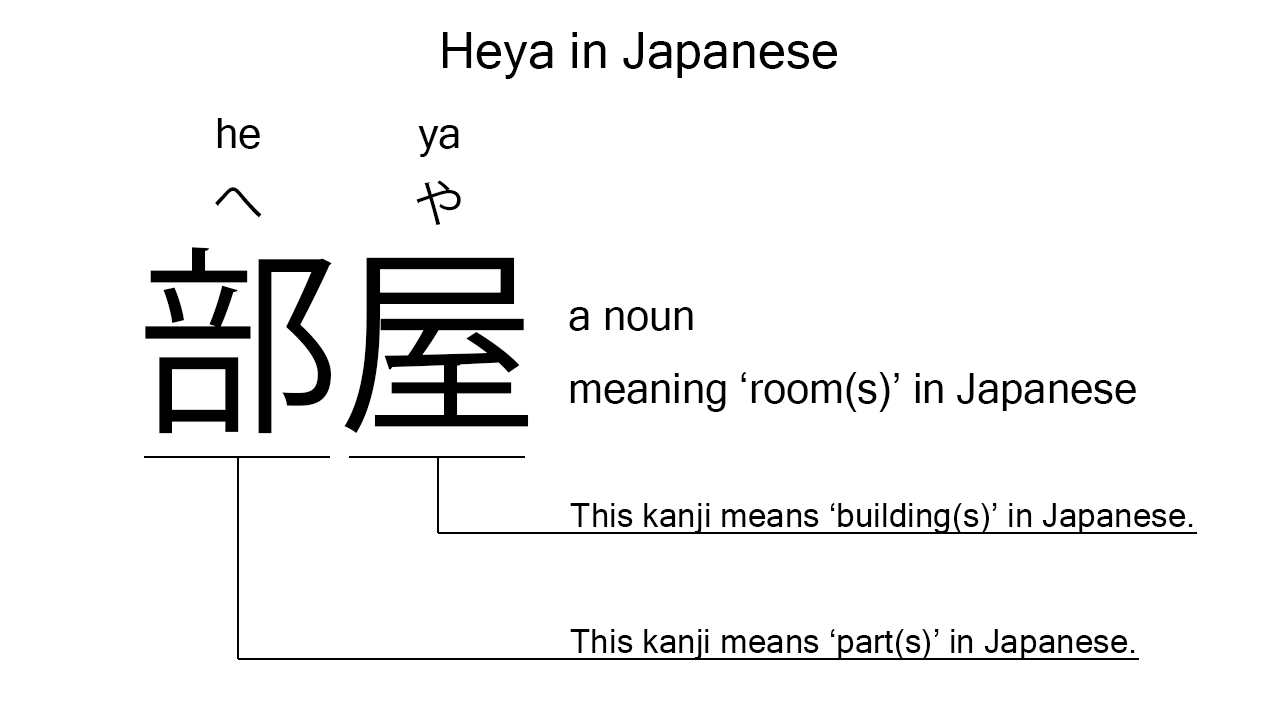What does “heya” mean in Japanese?
Native speakers say “heya” to mean ‘room’ in Japanese. Perhaps, some Japanese learners know this word as it is sometimes used in Japanese movies, songs, novels, manga, anime, and the like. In this blog post, however, I will explain this word in detail based on its kanji expression. And also, I will explain how to use it through example sentences. My explanations would help Japanese learners understand “heya” more clearly. Then, let’s get started!
Contents
Definition and meaning of “heya”
Let me start with the definition and meaning of “heya”.
- heya – 部屋 (へや) : a noun meaning ‘room’ in Japanese. This can also work as plural. Learn more about Japanese plural.
Japanese native speakers use this noun to refer to building parts which are surrounded by walls and windows. So, the usage of this noun is very similar to that of the English one, “room”, I think.
The definition and meaning are simple and clear. To understand this noun more clearly, however, let me explain its kanji characters in detail, one by one.
Heya in kanji
The kanji expression of “heya” consists of the following two kanji characters:
- 部 : a kanji character widely used to mean ‘part’, ‘section’, ‘element’, or ‘division’ in Japanese. This kanji can also be found in other words like “zenbu“.
- 屋 : a kanji character widely used to mean ‘building’, ‘house’, ‘shop’, or ‘roof’ in Japanese.
These two kanji characters tell us that “heya” literally means a ‘part of a building’ in Japanese. This literal interpretation is not completely in line with the actual meaning, but still understandable, I think.

When we meet new kanji expressions, we should check their kanji characters in detail to understand their meanings clearly and deeply. In many cases, kanji characters tell us a lot about the meanings of the expressions they form. Actually, here, we could get the better understanding of “heya” through the detailed kanji check above.
So far, I’ve explained the definition and meaning of “heya” together with its kanji characters. Then, let me explain how to use it through the example sentences below.
Example #1: how to say “room” in Japanese
boku wa ashita heya wo souji suru – 僕は明日部屋を掃除する (ぼくはあしたへやをそうじする)
I will clean my room tomorrow.
Below are the new words used in the example sentence.
- boku – 僕 (ぼく) : a pronoun meaning ‘I’ in Japanese. This is used mainly by boys and young males.
- wa – は : a binding particle working as a case marker or topic marker. In the example, this works after “boku” to make the subject in the sentence.
- ashita – 明日 (あした) : a noun meaning ‘tomorrow’ in Japanese. This can also work as an adverb almost anywhere in a sentence. In the example, this works as an adverb to say “tomorrow” in Japanese.
- wo – を : a case particle used to make the object word in a sentence. In the example, this is used after “heya” to make the object in the sentence.
- souji suru – 掃除する (そうじする) : a verb meaning ‘to clean’ in Japanese.
This is a typical usage of “heya”. In this example, it works as a part of the commonly-used phrase, “heya wo souji suru”, which means ‘to clean a room’ in Japanese.
Example #2: another usage of “heya”
kanojo no heya wa totemo hiroi – 彼女の部屋はとても広い (かのじょのへやはとてもひろい)
Her room is very spacious.
Below are the new words used in the example sentence.
- kanojo – 彼女 (かのじょ) : a pronoun meaning ‘she’ in Japanese.
- no – の : a case particle used after a noun or pronoun to make its possessive case. In the example, this is used after “kanojo” to make its possessive case, “kanojo no”, which means ‘her’ in Japanese.
- totemo – とても : an adverb of degree meaning ‘very’, ‘much’, ‘so’, or such in Japanese. In the example, this works before “hiroi” to emphasize its meaning.
- hiroi – 広い (ひろい) : an i-adjecitve meaning ‘spacious’ or such in Japanese.
This is another typical usage of “heya”. When we want to say “room” or “rooms” in Japanese, this noun is always a very good option.
Summary
In this blog post, I’ve explained the definition and meaning of “heya” in detail based on its kanji expression. And also, I’ve explained how to use it through the example sentences. Let me summarize them as follows.
- heya – 部屋 (へや) : a noun meaning ‘room’ in Japanese. This can also work as plural. Japanese native speakers use this noun to refer to building parts which are surrounded by walls and windows. So, the usage of this noun is very similar to that of the English one, “room”, I think. These two kanji characters literally mean a ‘part of a building’. This literal interpretation is not completely in line with the actual meaning, but still understandable.
Hope my explanations are understandable and helpful for Japanese learners.